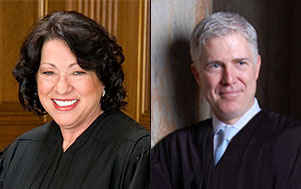Sotomayor joins Gorsuch in dissent from cert denial in restitution case

Supreme Court Justices Sonia Sotomayor and Neil M. Gorsuch. Photos courtesy of the U.S. Supreme Court.
Supreme Court Justice Sonia Sotomayor has once again joined with Justice Neil M. Gorsuch to dissent from the high court’s refusal to hear a case.
At issue in the latest case is whether judges rather than juries can make findings of fact justifying a restitution order. The dissent, issued Monday, argues that the Supreme Court should have accepted the case, Hester v. United States. (The dissent begins at page 42 of the PDF.)
In November, Sotomayor joined Gorsuch’s dissent arguing that the Supreme Court should have accepted a drunken driving case. The drunken driving suspect had argued she was denied the right to confront witnesses guaranteed by the Sixth Amendment when an analyst who performed a blood-alcohol test did not testify at trial.
A different Sixth Amendment right—the right to a jury trial—was before the court in the new case. Gorsuch argued that the case is important because of the prevalence of restitution orders.
“From 2014 to 2016 alone, federal courts sentenced 33,158 defendants to pay $33.9 billion in restitution,” Gorsuch wrote. “And between 1996 and 2016, the amount of unpaid federal criminal restitution rose from less than $6 billion to more than $110 billion.”
Failure to pay restitution can have a “profound” impact, including suspension of the right to vote, continued court supervision and even reincarceration, he said.
Sotomayor also dissented from a cert denial in a separate case on Monday, Cleveland v. Sellers. She argued that the Supreme Court should have accepted the case of Georgia death-row inmate Donnie Cleveland Lance.
Justices Ruth Bader Ginsburg and Elena Kagan joined Sotomayor’s dissent.
Sotomayor said Lance suffers from “significant cognitive impairments,” but the jury never heard about it because his lawyer “inexcusably failed even to look into, much less to put on, a case for sparing Lance’s life.”
The lawyer, a solo practitioner, was so convinced of Lance’s innocence that he never prepared for a sentencing phase of the trial, Sotomayor said.
Lance had possible cognitive problems caused by multiple car crashes, alcoholism, being shot in the head, being trampled by a horse and ingesting gasoline as a child, Sotomayor said. (The dissent begins at page 46 of the PDF.)



